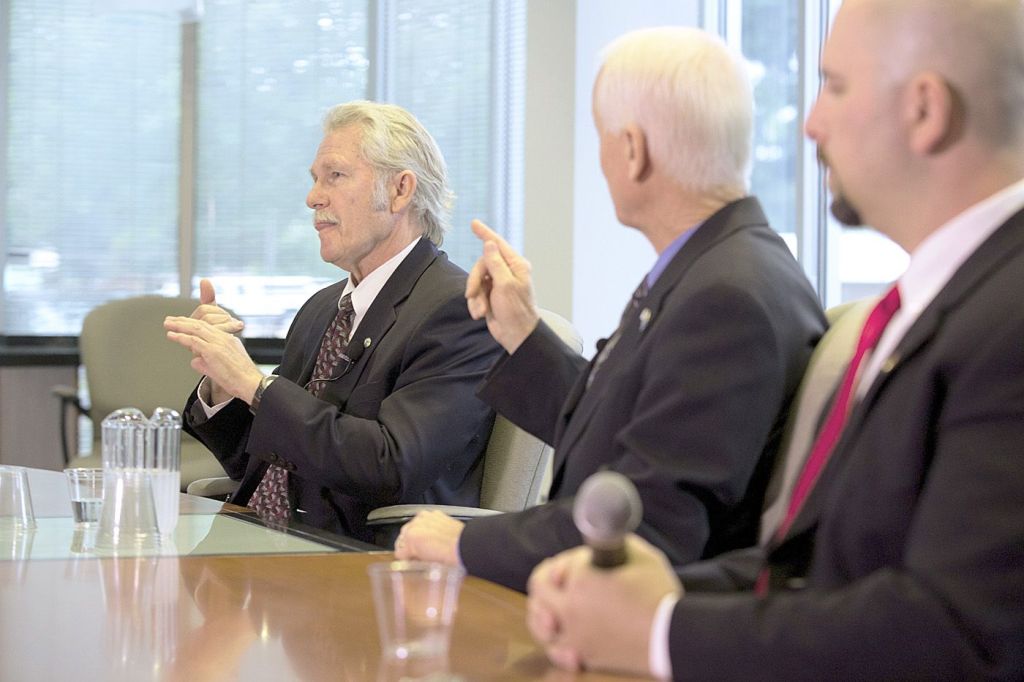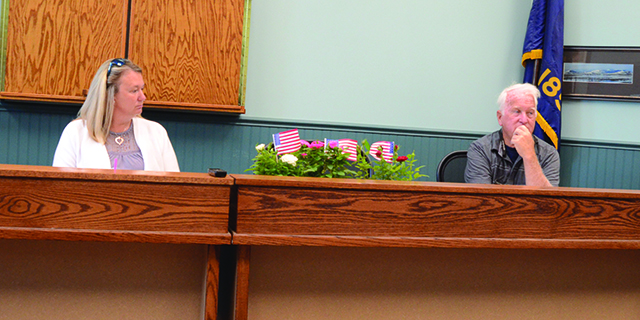No headline.
Published 9:36 am Monday, September 22, 2014

- Dennis Richardson, District 4, disputes a statement made by Gov. John Kitzhaber speaks during the Oregon Governor's debate at Pamplin Media Group Headquarters.
Democratic Gov. John Kitzhaber defended his record of achievement Monday morning while Republican and Pacific Green rivals battered him on the Cover Oregon website fiasco, education funding and the economy during an appearance before the editorial boards of the Pamplin Media Group and the EO Media Group.
Kitzhaber, who is seeking an unprecedented fourth term in office, told editors and reporters during a free flowing discussion that thousands of jobs have been created during Oregon’s economic recovery and a record 95 percent of Oregonians now have health insurance coverage.
Trending
“I think the biggest difference is that I have a solid record of accomplishment,” Kitzhaber says about the record third term he was elected to in 2010, after being governor from 1995 to 2003. “We’ve heard from Dennis (Richardson) today a lot of criticism. I understand politics is about scoring political points. He’s doing a good job of that. But he did not have very concrete, very specific proposals, about how he is going to deal with education and economic development.”
During Kitzhaber’s latest term, lawmakers set up a superboard to oversee all education spending from early childhood education through graduate school. Oregon also expanded health insurance coverage through the federal Medicaid program and private insurance.
Kitzhaber also noted that his leadership in a special 2013 legislative session that yielded more money for schools and social services, yet reduced public-pension costs and small-business taxes.
Republican nominee Richardson, a state representative from Southern Oregon since 2003, assailed Kitzhaber for specific failures such as the Cover Oregon website and the proposed Columbia River Crossing linking Portland with Vancouver, Wash. Neither project came to fruition and the state spent millions on both with little to show for the money.
Richardson also says Oregon’s unemployment rate has been consistently above the national average for 18 years, while its high school graduation rate of 68 percent is among the nation’s lowest.
Vic Atiyeh’s re-election in 1982 was the most recent time Oregonians have elected a Republican as governor, and Richardson says it’s time for a change.
Trending
“To do that we have to install a different kind of leadership, where you have a governor who pays attention to the details,” he says.
Richardson says he would institute a lieutenant governor — Oregon is one of 14 states without one — to promote international trade. He also would have Oregon ditch federal Common Core educational standards promoted among the states and return control of public schools to local boards, which get the lion’s share of operating funds from the state.
The Pacific Green Party gubernatorial candidate, Jason Levin of Portland, had not been scheduled but crashed the event.
Levin says as the major-party nominees, Kitzhaber and Richardson are raising huge sums for television commercials and other campaign promotions.
“That money comes with strings attached,” he says. “I have no strings attached when it comes to working for the people of Oregon.”
Monday’s forum was the first of several scheduled between Kitzhaber and Richardson through Oct. 14.
Only the League of Oregon Cities conference on Saturday in Eugene will have as participants all six candidates on the ballot. In addition to the three Monday, they are Aaron Auer of Aurora, Constitution Party; Paul Grad of Cave Junction, Libertarian Party; and Chris Henry of Portland, Progressive Party.
All three candidates agree on at least one thing: the state needs more water storage.
Kitzhaber called water storage a “huge and very high priority.”
“We’re at the epicenter of climate change,” he said. “We’re going to see agriculture moving north from California with the collapse of their aquifer.”
Kitzhaber said he’s been working on a collaborative approach to withdrawing more water for aquifer recharge from the Columbia River since the first term of his administration.
Water diverted during winter can be used for irrigation as well as by fish in the dry season, he said. “It’s not one of those false choices. You can actually do both.”
He also noted that Oregon is working with federal agencies to help irrigation storage and water treatment projects along the West Coast that are too small to win funding from large investors.
Richardson said Oregon doesn’t need additional years spent in task forces and commissions on water storage.
The state needs more water resources but it currently withdraws much less water from the Columbia River than Idaho or Washington, he said.
Richardson said the state should form a partnership with the federal government to withdraw its fair share of water from the river.
“We could easily be able to provide irrigation for 30,000 new acres of productive land in Eastern Oregon,” he said.
Levin said withdrawing water for storage during winter should be a higher priority than preserving in-stream flows during that season.









